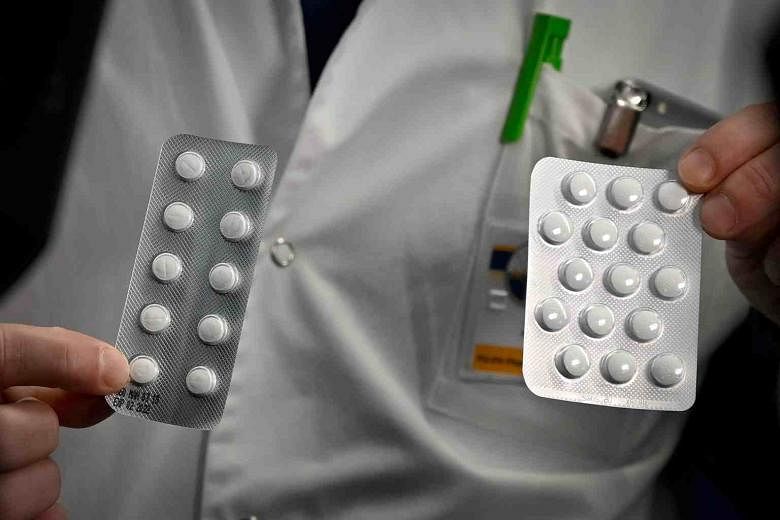BANGKOK - It is yet unproven, but a belief that a drug commonly used to control inflammation could be a ward against the coronavirus has triggered a run on it, making it tough for patients suffering from illnesses such as lupus and arthritis to find relief.
Chronic patients such as teacher Wun Pyae Thidar, a lupus patient from Myanmar's Taungoo city, have had difficulties securing supplies of the anti-malarial drug chloroquine and its derivative hydroxychloroquine.
The 28-year-old and her mother, who has rheumatoid arthritis, are long-time users of hydroxychloroquine, which used to be easily available.
But over the past two weeks, the drug started disappearing from the shelves of pharmacies.
"My father went to four big pharmacies in Taungoo but couldn't find it," she told The Straits Times. "People from the nearby towns had come into the city and bought it all." He eventually secured the medicine from somewhere else with the help of a friend.
Ms Wun Pyae Thidar's experience is now common in parts of South-east Asia, where people are hoarding chloroquine and hydroxychloroquine because they believe it would ward off the coronavirus behind the global pandemic that has killed more than 17,000 people so far.
While Chinese and French researchers have conducted studies on Covid-19 using chloroquine or hydroxychloroquine, concrete results have proven elusive.
Then, last Saturday (March 21), United States President Donald Trump appeared to endorse the therapy, referring to a small-scale experiment publicised in the International Journal of Antimicrobial Agents on his Twitter account. Mr Trump wrote that hydroxychloroquine and azithromycin - an antibiotic - "have a real chance to be one of the biggest game changers in the history of medicine" when taken together.
Pharmacies have been swamped with requests, based on ST's checks conducted in Myanmar, Indonesia and Vietnam.
While technically a prescription medicine, chloroquine can be bought over the counter in a region where locals try to get around poor health systems by self-medicating with purchases from loosely regulated pharmacies.
The dangerous practice has already landed at least one man in hospital in Hanoi. According to local reports this week, a 44-year-old man swallowed 15 tablets of the drug, believing it could prevent him from being infected with the coronavirus. He was sent to the capital's Bach Mai hospital for emergency treatment, and has since been discharged.
In Arizona, the United States, a man in his 60s died after attempting to self-medicate using a form of chloroquine used to clean fish tanks.
"Right now, there is no strong evidence that chloroquine and hydroxychloroquine work and I feel that countries which are recommending it already, such as India, are making a mistake," Thailand-based Professor Nicholas White from the Mahidol Oxford Tropical Medicine Research Unit told ST. "It's possibly beneficial, it's possibly harmful. The only way to find this out is to do good randomised trials."
The tropical medicine specialist, who is currently trying to conduct a placebo-controlled trial on the use of chloroquine and hydroxychloroquine to prevent coronavirus infections in healthcare workers, warned that both drugs are dangerous in high doses.
"It can kill you if you take too much. If you take it for a long time in high doses, it can damage the eyes and the muscles," he said.
That has not stopped the effort to ramp up chloroquine supply in Indonesia. President Joko Widodo on Monday said the government has secured three million tablets of chloroquine.
"There is neither a cure nor an antivirus to Covid-19, but in drawing from the experiences of countries, chloroquine can be used to help patients recover from the disease," he said.
It triggered a run on chloroquine. On popular shopping websites like Tokopedia.com and Bukalapak.com, a box of 60 200mg tablets goes for as high as 1.95 million rupiah (S$172).
The chloroquine hype has made life more difficult for Indonesia's 1.5 million lupus patients, who need a regular supply of the drug.
"We can't force the pharmacies to sell the drug only to lupus patients, as they are also running a business," said Ms Tiara Savitri, president of Yayasan Lupus Indonesia, a non-profit organisation caring for this community.
"I hope the public will not buy and hoard chloroquine unnecessarily and spare a thought for the people with chronic diseases who have a real need for them. With worries over Covid-19 infections, it's also hard for them to get out of the house just to hunt for chloroquine."
Lupus patient Pratiwi Dyamurti came up empty-handed after visiting five Jakarta pharmacies recently, but received a supply from the Yayasan Lupus Indonesia on Tuesday.
"The masks and sanitisers were sold out long ago, and now chloroquine too. I'm stressed and worried that I will not be able to secure any," the 28-year-old administrative assistant said.
Additional reporting by Zin No No Zaw











